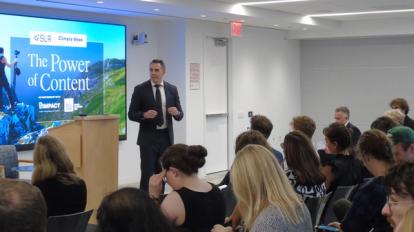
Computational Fluid Dynamics (CFD) modeling: A powerful tool to reduce data center energy use
by Brian Bakowski, Ian Todreas, Jim Hiller
View post

At Climate Week NYC, we gathered leaders across media, technology, and advocacy to explore one of the most pressing questions in the sustainability space: how can the media sector harness its cultural superpower to accelerate climate action? Happening in one of our favorite culture hubs, Penguin Random House’s New York headquarters, our in-person event, The Power of Content, brought together over 80 participants from local NGOs, academia, and international organizations.
SLR’s Chief Executive Officer, Bradley Andrews, opened the conversation by grounding us in a central truth: climate is no longer a technological problem – it is a societal and political will problem. He emphasized the pivotal role media plays in shaping societal priorities and galvanizing change. Through initiatives like DIMPACT, a media industry coalition that aligns industry players around meaningful solutions to reduce the environmental impacts of digital content, and the Responsible Media Forum, which has explored content as the media industry’s number one sustainability issue, collaboration is proving essential.

“Coming together is so important to establish alignment and shift the paradigm to the areas that really matter,” Bradley reminded the audience.
The event featured a dynamic discussion led by Danielle Mulder (BBC), Hanna Grahn (Spotify), and Dr. Genevieve Guenther (End Climate Silence), moderated by SLR Consulting’s Daniel Witte and Will Pickett. Here is a handpicked series of insights from our conversation:
The event convened voices across industries—media and entertainment, NGOs, academia, technology, and finance. The energy in the room became even more palpable when we came to the Questions & Answers. Here’s a selection of the poignant questions and answers from our panel:
How can we bring more of nature and biodiversity into the climate debate?
The panel agreed there is still work to do in connecting these topics with climate. One of them acknowledged: “As an environment team, we lean more towards climate editing. There are ways to counteract this, and another option we’ve been looking into is including an editor dedicated to nature.
Another example is that we should not underestimate the impact and influence of high-profile personalities like Sir David Attenborough in bringing these topics to the spotlight. His impact and the focus on natural history definitely had a big bearing on the level of education on this topic in the UK.
What are effective ways to bring the climate conversation to life?
We need to meet people where they're at and we need to use the kind of levers that make sense to them, whether it be nature, whether it be health, to really try and bring the kind of debate alive to make these topics tangible and real for people. Communication channels are important, and that’s why organizations are more and more present at festivals, movie screenings, etc. to engage with their core active audience.
How can we depoliticize climate issue by making it broader and lean into what we're good at, which is natural history programming?
You come back to science-based facts and education. For instance, if you talk about nature and our dependency on nature, how 50% of the world's GDP is reliant on nature and a healthy, thriving planet, you can start changing the conversation.
The conversations carried a simple, yet powerful idea: media shapes the stories we tell each other, and those stories shape our collective future. As our guests reminded us, it’s not about the big challenge; it’s about the first step. And only when society believes does society genuinely do.
We extend our gratitude to the Penguin Random House team for hosting us during this packed week, and to our outstanding panelists Danielle Mulder, Dr. Genevieve Guenther, and Hanna Grahn for their insights and leadership.